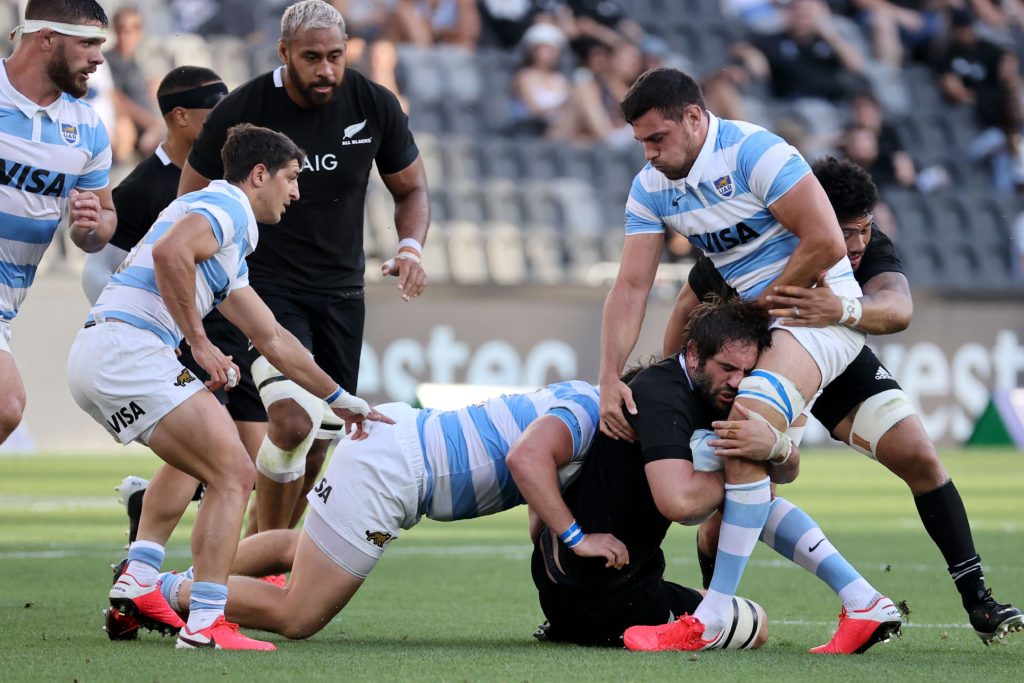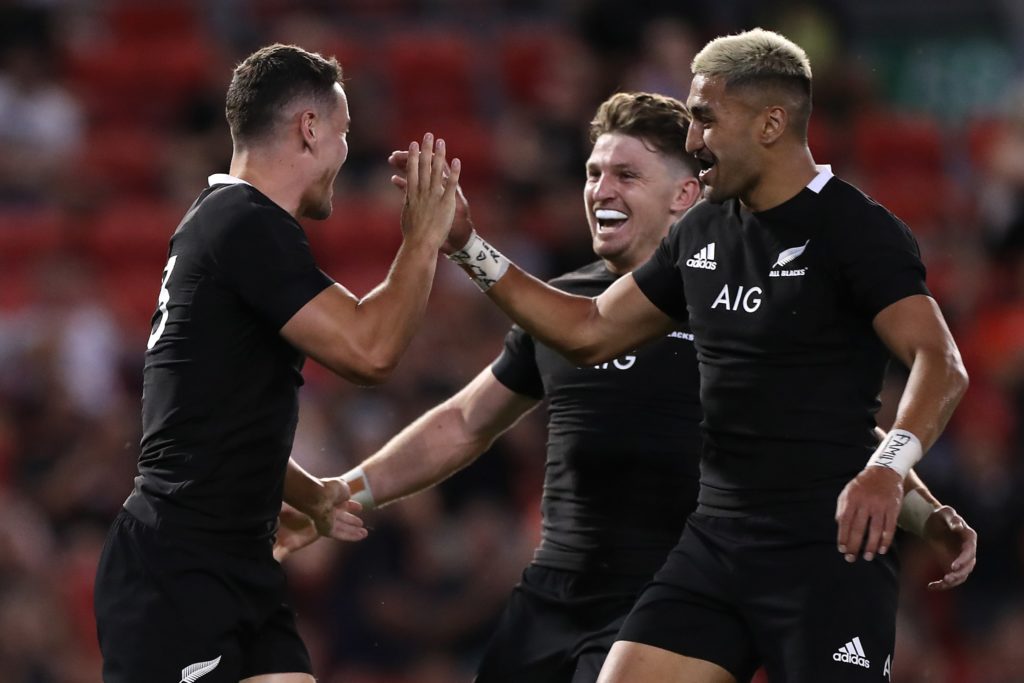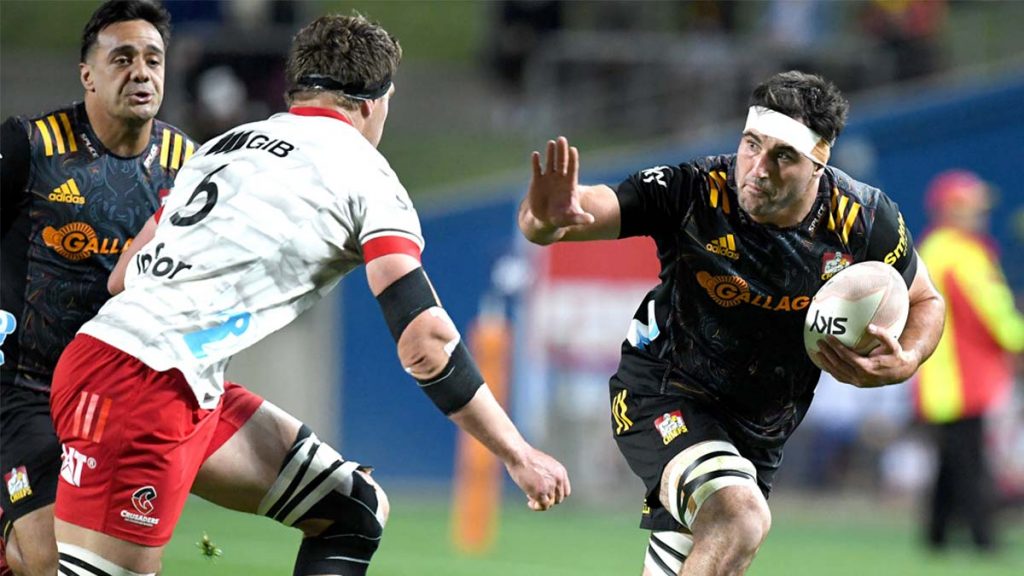It wasn’t always apparent what was at the core of the All Blacks last year. At times – specifically when they beat the Wallabies by a record margin in Sydney and thumped the Pumas 38-0 in their final game – it was quite possibly Tungsten steel.
When they lost to Australia in Brisbane and suffered their first defeat in history to Argentina, it seemed as if there was nothing more substantial at the centre of the All Blacks than meringue or perhaps blancmange.
They endured a crazy old year certainly, being brilliant when they were on and almost qualifying as awful when they were off.
To some degree the All Blacks were a reflection of the wider craziness that defined 2020. It was a year like no other in the last century – weird, unsettling and even scary at times with sport never sure whether it had been relegated to a giant irrelevance or the most important distraction spooked societies needed.
[The All Blacks] had to make up their preparation on the hoof and while that might not have been such a big deal if it had happened in 2018, it was an issue in 2020 as there was a new head coach with an entirely new wider management team.
For the All Blacks it meant they had their programme reduced to six tests, four of which were in Australia.
The bigger issue, however, was that they had to make up their preparation on the hoof and while that might not have been such a big deal if it had happened in 2018, it was an issue in 2020 as there was a new head coach with an entirely new wider management team.
It was a disrupted year for everyone but COVID didn’t produce a uniform impact. Unquestionably Argentina were hit harder as they had no domestic rugby and a harsher lockdown where their players had to train without leaving their homes, and yet that may have perversely helped them.
The Pumas had it rough but the one thing they did have was a prolonged period of assembly and training together ahead of their first tests.

New Zealand had an easier ride than most – able, as they were, to resume their revamped Super Rugby Aotearoa in June after the original competition shut down in mid-March.
The players were conditioned and battle-hardened, but the issue was the team had next to no time together before they played their first test of the year against the Wallabies in Wellington.
“It was an incredibly difficult year,” says All Blacks assistant coach John Plumtree, who was destined to be head coach of the Hurricanes in 2020 until Ian Foster won the top job in mid-December 2019 and brought the former Shark into his set-up.
“COVID hit and we had to do a lot of meetings via Zoom. We assembled and pretty much had one week before the first Bledisloe. It was a case of put the bags down and we were into it.
“This year has been different in the way management have been able to prepare, how we have been able to get round the players and franchises and feel way more prepared than we did last year and this series gives a chance to prepare ahead of the Bledisloe Cup series as well. It is a world apart from last year.”
New Zealand rugby seemed to have an awakening this year about what really matters in the game. What defined Super Rugby Aotearoa in 2021 was the relentless physicality.
Whether the coaching team are indeed better prepared will only become apparent in the months to come, but the make-up of the first All Blacks squad of the year certainly hints at the thought and planning that has already been put into 2021.
The All Blacks are likely to play 15 tests this year – nine in New Zealand and six on the road. They will also face nine different countries – with the clashes against South Africa, Ireland and France likely to pose entirely different challenges to those presented by Fiji, Tonga, Australia and Argentina.
And when the All Blacks squad is properly dissected, its flexibility and versatility becomes obvious. There is a variety of athletes among the front-rowers, different skill-sets contained within the five locks and all sorts of ability tied up in the loose forwards.
The backline can bet set up in so many different ways it’s impossible to believe it will look the same from test to test and when the possible options include Richie Mo’unga, Beauden Barrett, Anton Lienert-Brown, Rieko Ioane, Will Jordan, Sevu Reece, Damian McKenzie and Jordie Barrett, there is no prospect of the All Blacks being predictable.
But what’s maybe not so apparent is that there is a toughness about this team that was maybe not there last year. This is a squad that seems more likely to fulfil its stated goal of returning to the number one spot in the world by the end of the year.

The fluctuations of last year are unlikely to be seen because New Zealand rugby seemed to have an awakening this year about what really matters in the game. What defined Super Rugby Aotearoa in 2021 was the relentless physicality. Normally New Zealand is taken with showier forwards – those who show up in the loose with their soft hands and clever decision-making. But this year the narrative has been different – with the likes of Ethan Blackadder and Patrick Tuipulotu hailed for their unflinching desire to hurt people.
Losing to England in 2019 hurt a proud All Blacks team and the lessons have been absorbed. What we have seen throughout 2021 is a realisation across the entire rugby landscape that the game is won and lost in the collisions at the moment and that patience, resilience and an appetite for destruction are the qualities that often prove to be the most valuable.
Throughout Super Rugby there were examples of the high skill levels that are inherent in New Zealand’s players, but so too was there just as much evidence that most athletes have grasped the need to be as direct and confrontational as they are expressive.
A missive to be direct and physical was clearly understood by the likes of Blackadder, Shannon Frizzell, Ethan de Groot, Joe Moody before he was injured and Dalton Papalii among others.
We were delighted by Super Rugby Trans-Tasman from the perspective that we got exposed to some different sorts of things. First and foremost, scrums and the different ways teams are tying to scrum for penalties and disrupt versus trying to scrum to restart the game and that was a good learning curve for most of our team.
All Blacks coach Ian Foster
Super Rugby Aotearoa produced epically demanding contests where there was genuine crunch in the collisions and a desire to test each other around the fringes.
The nature of most games was different this year. Slower, but not slow, more controlled and strategic with a greater willingness among all five teams to barge, bash and maul over the line.
While Super Rugby Trans-Tasman didn’t produce such relentless collisions or arm-wrestles, All Blacks coach Ian Foster still felt his players took plenty out of the clip-on competition.
“We saw some really passionate teams that were really well coached and all five developed over the season,” says Foster.
“And that is all we ask for, that we see a growth. Overall it gave us a good platform. We were delighted by Super Rugby Trans-Tasman from the perspective that we got exposed to some different sorts of things.
“First and foremost, scrums and the different ways teams are tying to scrum for penalties and disrupt versus trying to scrum to restart the game and that was a good learning curve for most of our team.”

Plumtree, who is in charge of the forwards, also feels he saw plenty of what he was looking for.
“If we look at some of the teams that we are playing, South Africa, Argentina to Australia – they throw different things at you. We think we have got a skilful side and we think we have got muscle too.
“We are always looking for loose forwards – in fact all of our forwards have got to be dominant around the collision area. Scott McLeod [defence coach] is talking to the players and they all want to be dominant too and we are seeing that in their tackle technique and how they are improving in that area.
“Their ball carrying as well – how they can carry and get across the gainline. If you look at those loose forwards and how they went through Super, you would say all of them are capable of that and if you look at our locks you would say they are capable as well. That’s the benchmark – what we want.”
And that’s arguably going to be the difference between the All Blacks in 2021 and 2020. This year, the emphasis will be more heavily placed on being physical first, creative second.
If you look at the skill level of some of the boys, that’s right up there as well. Take Luke Jacobson, I have been really impressed with him in that department with the Chiefs.
All Blacks assistant coach John Plumtree on the current crop of forwards
The likes of South Africa, Ireland and France probably can’t be beaten by only offering a wide-wide game. They can be broken down and pulled apart, but it will take a prolonged battle to get to that point and the All Blacks appear to have accepted that no matter who they are playing this year, they have to be more physical than they were last year.
The All Blacks won’t give up on their continuity game or restrict their obviously skilled forwards from using the ball, but they will demand confrontation be the core ingredient of their offering.
“If you look at the skill level of some of the boys, that’s right up there as well,” says Plumtree. “Take Luke Jacobson, I have been really impressed with him in that department with the Chiefs.
“The amount of offloads he makes in contact and the ability of all of our loose forwards to keep the ball alive and to get defences open, that’s what you need. But you can’t get away from the sheer grunt as well.”
The proof of the pudding will be in the eating as always but there is reason to believe the All Blacks will find the level of consistency they are after, because they will build the foundation on the set-piece, hard running lines, big tackles and a willingness to fight at the coalface rather than default to pushing the ball wide.


Comments
Join free and tell us what you really think!
Sign up for free